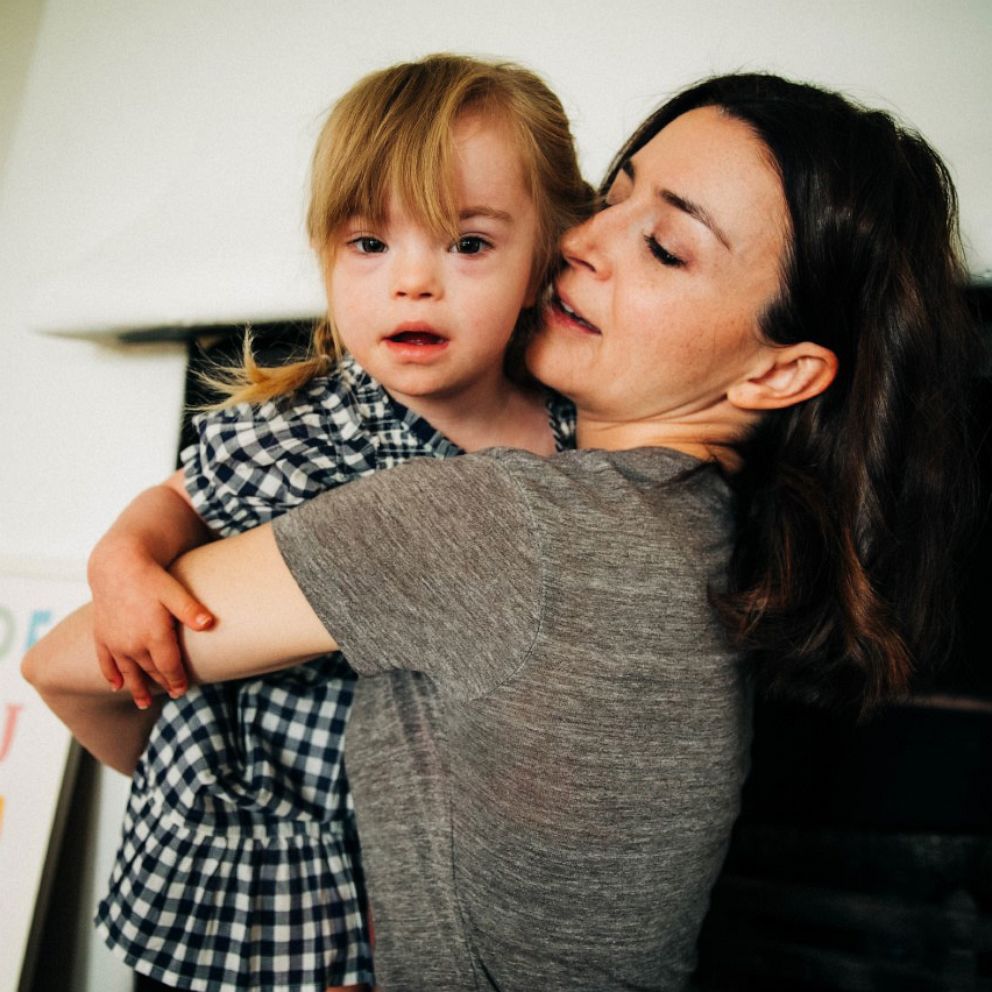


In honor of Down Syndrome Awareness Month, "Grey's Anatomy" star Caterina Scorsone, whose 3-year-old daughter, Pippa, has Down syndrome, opened up about her family, her advocacy and why equity is so important. Scorsone is also the mother of 8-year-old Eliza and 10-month-old Lucinda.
My daughter Pippa has rainbow-colored eyes. The colors go the other way around, like an upside down rainbow. It starts with an indigo ring around her iris that gives way to a deep evergreen, which sparkles into hazel flecks that turn a sunset shade of golden orange near the center. The colors stand out, differentiated by the Brushfield spots, which come with the 47th chromosome that creates Down syndrome in a person’s DNA. Pippa has Down syndrome.
But Pippa isn’t Down syndrome. Pippa is Pippa.
Her hair is like soft-spun caramel. She likes wearing dresses more than pants. She particularly likes dresses with moons and stars on them. She likes popcorn and Totoro and elephants. Pippa loves her big sister and her baby sister, too. She likes toast with butter, trampolining, and lip-syncing to Sia and the "Sing" soundtrack. Pippa likes the color red and does not like having her hair washed in the tub. She likes swimming and sign language and coconut water.
Pippa is different.
She has a visual learning profile that makes it easier for her to learn from pictures and printed words than from hearing a teacher lecture. She could read simple words at 3 years old but took longer than her sister to be able to talk because of differences in her oral motor planning and muscle tone. Pippa has almond-shaped eyes and a slightly wider sandal gap between her toes. She is small for her age but her eyes are wise. She always says what she means and doesn’t suffer fools.
Pippa is different. So are you and so am I.
Pippa has needs that are specific to the way her body was made. I have needs that are specific to the way my body was made. We all do.
For Pippa to accomplish what she chooses to accomplish, to thrive and fulfill the desires she has for herself, she needs to be supported in specific ways. So do I.
Pippa is different. So are you and so am I.
To have the same opportunities for fulfillment that I have, Pippa needs things like therapies designed to support her learning differences and physical challenges. She needs more media visibility for people who look like her, so that people recognize her as part of their community, and so she can recognize herself in the aspirational characters she sees on TV and in the press. When she’s older, she’ll need support with some of her life skills (like a lot of us do), and with finding a job that’s the perfect fit for her skills and talents. She’ll need some supports to get an equal shot at life. She’ll need equity.
Equity is a more useful word than equality. Equity embraces our differences. Equality sometimes accidentally erases them and in so doing, creates disadvantage and inequality for a great many people.
What is equal about Pippa, and about you and me, and all of the other human beings on this planet, is our dignity. We are equal in the very fact of our miraculous existence. We are the same in our right and desire to connect and find fulfillment, to find joy and community. What is different is what each one of us needs in order to have those things.
For us to have equity, we each need to be seen as worthy and precious because of, rather than despite our differences. We need to have our uniqueness seen and acknowledged and protected through legislation and social structures that celebrate and value that difference. We need the economic and social structures we uphold, from education to healthcare to criminal justice to banking and tax law, to support the fulfillment of each person, rather than the other way around. Our culture of late has been seeing things upside down and it’s time to right side it. We need to align our structures with our values. We need to flip the mirror and remember who we are.
We each need to be seen as worthy and precious because of, rather than despite our differences.
For us to organize ourselves in a way that allows for equality in the fullness of our difference, we need to remember that every individual human being is the point. Each unique person is the whole story, interconnected fractals of a wholeness called "love." No one is less or more useful on the way toward something else. Human beings seen as a means is exploitation. Human beings seen as an end is dignity. It’s love.
Regardless of the number of chromosomes or abilities we have, the gender we express, the money in our bank account, the color of our skin or the learning profile we respond to best, human beings have the same needs. We need love, safety, dignity and connection.
But human beings are different, we are specific, and we need to be loved and supported individually. We are the unique and distinct notes of an infinite musical composition. We are every beautiful rainbow color refracted through the mysterious prism of life. We are equal, different and miraculous, like Pippa’s eyes.